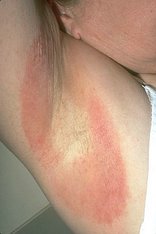Signs and Symptoms

Signs and Symptoms It can be difficult to avoid all the triggers, or irritants, that may cause your eczema to flare or become worse. In teens and young adults, the itchy patches of eczema usually break out where the elbow bends; on the backs of the knees, ankles, and wrists; and on the face, neck, and upper chest - although any part of the body can be affected.
If you have eczema, at first your skin may feel hot and itchy. Then, if you scratch, your skin may become red, inflamed, or blistered. Some teens who have eczema scratch their skin so much it becomes almost leathery in texture. Other teens find that their skin becomes extremely dry and scaly. Even though a lot of teens experience eczema, the symptoms quite a bit from person to person.
What Do Doctors Do?If you think you have eczema, your best bet is to visit your doctor. He or she may refer you to a dermatologist, a doctor who specializes in treating skin conditions. Diagnosing atopic eczema can be difficult because it may be confused with other skin conditions such as contact dermatitis, which occurs when your skin comes in contact with an irritating substance like the perfume in a certain detergent.
In addition to doing a physical examination, the doctor will ask you about any concerns and symptoms you have, your past health, your family's health, any medications you're taking, any allergies you may have, and other issues. This is called the medical history. Your doctor will also help you identify things in your environment that may be contributing to your skin irritation. For example, if you started using a new shower gel or body lotion before the symptoms appeared, mention this to your doctor because a substance in the cream or lotion might be irritating your skin.
Emotional stress can lead to eczema flares, so your doctor might also ask you about any stress you're feeling at home, school, or work.
Once your doctor has diagnosed the condition, he or she may suggest avoiding the things that may be triggers for your eczema. The doctor may also prescribe medications to soothe the redness and irritation of eczema. External creams or ointments that contain corticosteroids are frequently prescribed to help control itching. Your doctor might also recommend medications you take internally, such as antihistamines or corticosteroids. In teens who have severe eczema, ultraviolet light therapy may help clear up their condition and make them more comfortable. Newer medications that change the way the skin's immune system reacts are also prescribed in some cases.



0 Comments:
Post a Comment
<< Home